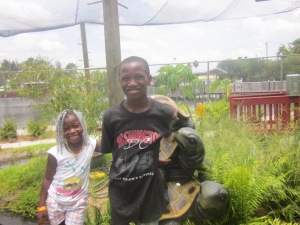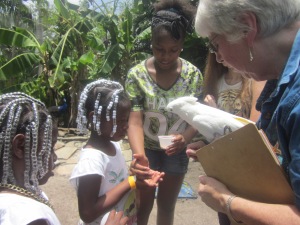Two Roman Catholic Women Priests Reflect on the Mustard Seed: Rev. Beverly Bingle,RCWP with Rev. Judy’s Reflections for June 14, 2015
Here is an insightful homily on the meaning of the parable about the mustard seed (Mark 4: 26-34) by Rev. Dr. Beverly Bingle of Toledo, Ohio. She challenges us to be part of the reign of God, growing and taking hold like weeds and yet challenges us to think what is happening when the reign of God seems not to be growing?
As she notes the first parable about the seeds springing up while we sleep challenges us to think just what are we doing to help the seeds of God’s reign to take hold and grow? Do we sow, or water, or tend the growing plants? What does God do, and what do we do? Indeed if we are asleep, God is doing most of the work. And yet there is a role for each of us in growing the reign of justice, compassion and love in our troubled world. Megan McKenna On Your Mark (p.60) asks “are we helping with watering, nurturing, harvesting? Or are we, indeed, being harvested? Do we belong to a community that produces enough wheat to feed others? ….Where are those who lay down their lives,falling under the sickle so to speak, so others can eat? ” This theme connects to our homily on Corpus Christi, the Body and Blood of Christ last Sunday. Are we willing to give all to building the kin-dom ,the reign, of God? If, as in the last sentence of this Gospel Jesus is still speaking privately to his disciples, how are we doing at listening? How attentive are we to reading and grappling with the meaning of the Word? How do we pray, share with God in relationship, what our concerns for the kin-dom are, for the weeds of us and the birds that seek shelter in the shade of the tree/large bush that the community offers for shelter? How do we actually share the heart of Christ as members of the Body? How, indeed do we show our compassion for the people and for the earth that God has given us? How are we attending to the word of God thrown out into the world?
In Luke 17: 5-10 and Matthew 17:20 Jesus speaks of the necessity of having faith in order to get the work of the reign of God done. Yet, he points out: even an infinitesimal amount of faith (the size of a tiny mustard seed) will do. Walter Wink, Prayer and the Powers points out that we do not have to be spiritual giants , most of us surely are not, but we do have to do what Jesus has asked us to do (in loving our God and really loving and serving our neighbors as ourselves) (Luke 17: 9-10), “Faith”, Wink says, “is not a feeling or a capacity we conjure up, but trusting God can act decisively in the world” (PP.14-15). And when we consider that the socioeconomicpolitical systemic snares faced by those who are poor and different are amazingly powerful, we cannot blame ourselves or God if prayers do not seem to be answered. For example, if homelessness and hunger and violence prevail even in the most affluent of countries as well as the poorest even as we do our best to address the issues where we are. We can ,ourselves, continue to believe in the power of God and work with God on making dents in those temporal forces that work against the fullness of life, dignity and worth of every human being.
Recently I have been discouraged about how hard the work of the kin-dom is in poor communities that continue to experience the long arm of racism and classism down the generations. I have been discouraged by gun violence especially among young people and the death of children and others who have nothing to do with gangs or drugs or “beefs”. And, I have been discouraged by the strength of addictions and the lack of resources to shelter the homeless and teach empowerment skills. But, due to the kindness of friends I have begun to realize that God’s work is the reign of justice, I have a part in it, but I do not have to do it all, nor can I. That realization comes with a renewal of my faith in God to get the job done and to raise up laborers for the vineyard, yes, for the garden full of weeds, that is here. Jesus said in Matthew 17: 19-20, that the lack of faith is what prevented the disciples from healing the boy who had awful seizures. Faith enables and sustains our work for the reign of God. Without tending our own faith through prayer(even when it is the very groaning of our spirits) and relying on God, it atrophies even smaller than that mustard seed and the works of God’s reign are then impossible to do. Two problems then may happen: first, we may feel that we ourselves have to do it all. We forget that it is not us but God that is speaking the kin-dom, the reign of God, of justice and love, into being. We then burn out and despair since we cannot make the miracles happen that change violence, neglect, abuse and pain in God’s children and our good green earth, at times struggling to breathe. Or, we pull back to an inactivity that pretending to be prayerful instead centers us on ourselves instead of on building the reign of God with God. Here is Walter Wink’s prayer that may empower us to truly have faith and to pray and act with every fiber of our beings to build the reign of God with God. “God, help me to refuse ever to accept evil; by your spirit empower me to work for change precisely where and how you call me; and free me from thinking I have to do everything”.
Rev.Dr. Judy Lee, RCWP
Co-Pastor The Good Shepherd Inclusive Catholic Community, Fort Myers, Florida
We now turn to Rev. Dr. Beverly Bingle’s Homily:
Today’s gospel has two seed parables,
the seed that sprouts and grows and ripens on its own,
and the tiny seed that grows into a large plant.
The first comparison is one that Jesus probably used
but, according to scripture scholars,
he would not have used it to talk about the reign of God.
That part comes from Mark,
who used it to contrast how little we contribute to the harvest
compared with what God contributes.
The second comparison, the parable of the mustard seed,
was one Jesus would have used,
and he would have used it to talk about the reign of God.
__________________________________________
The parable of the mustard seed
is in the canonical gospels of Mark, Matthew, and Luke
as well as the sayings gospel of Thomas.
The version of the parable closest to what Jesus would have said
is this straightforward and unadorned passage
in the Gospel of Thomas:
The disciples said to Jesus,
“Tell us what Heaven’s imperial rule is like.”
He said to them, “It’s like a mustard seed,
the smallest of all seeds,
but when it falls on prepared soil,
it produces a large plant
and becomes a shelter for birds of the sky.”
According to scripture scholar Raymond Brown,
that’s very close to the original idea of the parable
as Jesus would have told it.
____________________________________________
Five of us from Tree Toledo are taking a tree stewardship course,
and we keep hearing about invasive plants.
We’ve learned about invasive trees, like Autumn Olive,
#3 on the Ohio Department of Natural Resource’s top ten list. And
we’ve learned about invasive plants, like Garlic Mustard,
#7 on the list.
When American cooks hear the parable of the mustard seed,
they think of those round yellow spices
and know it’s definitely not the smallest of seeds.
When Ohio farmers and gardeners hear the parable,
they think of a weed run rampant through their crops,
their neat flower beds, and the rows of their vegetable gardens.
For them, Jesus is saying that the reign of God is everywhere,
and nothing can be done to contain it.
_________________________________________________
Even if you’re not a cook or a gardener or a farmer,
you know about dandelions.
You don’t have to plant them.
They grow everywhere.
When Jesus told this story to the people of Galilee,
they would have known that he was using hyperbole—
exaggeration to make a point.
And they would have been surprised
to hear God’s domain compared to a tiny seed,
even if not the smallest.
They also would have known
that a mustard seed does not grow into a tree.
Sure, it’s a big plant, three to five feet high, but not a tree.
They would have picked up on the fact
that Jesus was poking fun at the mighty cedar of Lebanon
and the apocalyptic tree of Daniel that reaches to heaven,
with its branches that cover the earth.
And they also would have picked up on the weed and its seed
as representing the poor,
the despised tax collectors, and the sinners—
invasive pests in the ordered garden of society
where the predatory birds attack and devour them.
And his audience would have chuckled at the comparison
and gone home uplifted and inspired,
understanding that, as Jesus told them,
the reign of God is here, among you.
You—the outcasts, the bottom of society,
the outsiders at the Temple—
you really are God’s people, chosen and beloved.
_________________________________________
Now, what about us, as we hear this gospel?
If the reign of God spreads as easily as mustard or dandelions,
what is it that we’re doing, or not doing,
that keeps God’s presence from ruling our world?
What kind of poisons are we spreading
that inhibit the growth of God’s reign?
When I examine my own conscience,
I see easily that my actions and inactions
contribute to the greatest moral issue of our time—
pollution of the earth
to the point that our very life as a species is seriously harmed.
Sure I live frugally, and recycle,
and don’t use drive-through windows,
and turn off the lights when I leave a room.
But I leave a great big carbon footprint
from the fossil fuels I use
to heat my home and drive my car
and mow my lawn and cook my meals—
a footprint way bigger than my fair share on this planet,
cutting off life right now
in impoverished communities around the globe,
and in the future for all of humanity—our great-grandchildren.
_____________________________________
This coming Thursday Pope Francis will promulgate
his encyclical on the environment, Laudato Sii—Praised Be!
Even before it’s released, it’s drawing anger and condemnation
from those who profit most
from the degradation of our environment.
But I’m hoping that it will be a prophetic call
heard by all of us, Catholics and everybody else,
to care for creation.
The Toledo Chapter of the Association of U.S. Catholic Priests
has put together a series of meetings,
every other week for five weeks,
to look at the encyclical and discuss it,
starting at Lourdes University this Thursday.
I’ll be there.
I want to hear what others have to say,
and I want to think about it seriously,
and I want to find out what I can do.
_________________________________________
Today Jesus is telling us the same thing
that he told those folks
who gathered around him at the lake that day.
Each one of us is a dandelion in the lawn, mustard in the field.
One person, yes,
but God’s reign is here among us,
and we spread its seeds
by the way we live.
Just like Jesus.
—
Holy Spirit Catholic Community
Saturdays at 4:30 p.m.
Sundays at 5:30 p.m.
at 3925 West Central Avenue (Washington Church)
Rev. Dr. Bev Bingle, Pastor





Helpful, truthful, challenging, enlightening, inspiring, compassionate – thankyou